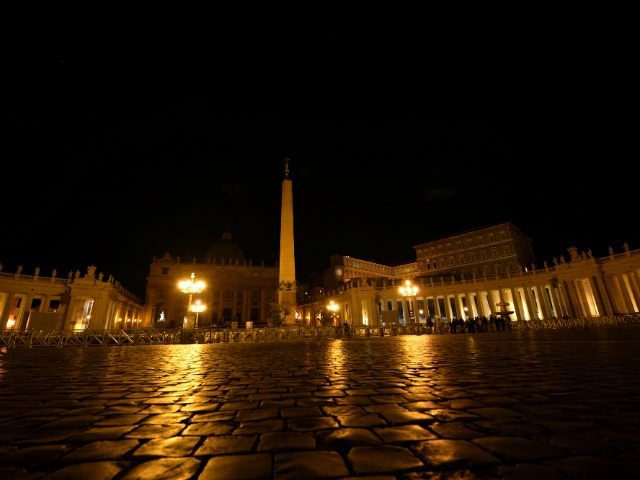On Saturday evening, Saint Peter’s Basilica will commemorate “Earth Hour” by switching off all the lights on its iconic façade and dome, joining a host of other world monuments in demonstrating “concern for the future of our planet.”
From 8:30 to 9:30 pm, the darkened basilica joins the 2007 initiative of the World Wildlife Fund (WWF) in symbolically abstaining from the use of energy for an hour. According to Vatican News, some “hundreds of millions of people” around the globe will also be switching off the lights in their homes for an hour.
Saint Peter’s will join the Eiffel Tower in Paris, the Brandenburg Gate in Berlin, the European Parliament in Strasbourg, the Acropolis in Athens, the Colosseum in Rome, the Alhambra in Granada and the Houses of Parliament in London, to name just a few European monuments participating in the event. Last year, 172 countries and territories participated in Earth Hour and more than 10,000 landmarks and monuments switched off their lights.
“Following the COP21 agreement, this year’s Earth Hour has a particular significance,” said European Parliament President Martin Schulz. “Thanks to the agreement reached in Paris we have to move from pledges to actions, from mapping the route for the future to walking on that route. Everyone has to commit to stop global warming and saving the planet – every individual, every organisation and every institution. That’s why the European Parliament is proud to take part in the Earth Hour.”
The WWF has plenty of critics, even among climate-change dogmatists. The Copenhagen Consensus Center, for instance, a “think tank that researches and publishes the smartest solutions for the world’s biggest problems,” the Earth Hour project “is nothing but an ineffective feel-good event.”
Earth Hour “does little for the climate in terms of reducing CO emissions and distracts us from the real problems and solutions — especially giving light to those in the darkness,” the Center states on its website.
Even the liberal journal Slate has criticized Earth Hour, saying that its “vain symbolism reveals exactly what is wrong with today’s feel-good environmentalism,” and others have said that the symbolic act “celebrates ignorance, poverty and backwardness” and promotes the idea that “civilization is something to be ashamed of.”
Yet many other scholars have expressed deeper problems with Earth Hour that go to the very heart of the modern environmentalist movement itself, suggesting that the initiative is just one more senseless activity encouraging an obscurantist attitude toward the benefits of modern energy and technology.
The Ayn Rand Institute, for example, proposes that Earth Hour exploits blindness to the vital importance of energy, sending “the comforting-but-false message: Cutting off fossil fuels would be easy and even fun! People spend the hour stargazing and holding torch-lit beach parties; restaurants offer special candle-lit dinners. Earth Hour makes the renunciation of energy seem like a big party.”
Observing Earth Hour “bears no relation whatsoever to what life would actually be like under the sort of draconian carbon-reduction policies that climate activists are demanding: punishing carbon taxes, severe emissions caps, outright bans on the construction of power plants,” wrote Dr. Keith Lockitch, a physicist with postdoctoral research in relativistic astrophysics.
“The lights of our cities and monuments are a symbol of human achievement, of what mankind has accomplished in rising from the cave to the skyscraper,” says Lockitch. “Earth Hour presents the disturbing spectacle of people celebrating those lights being extinguished.”
The vast spectrum of opinions toward initiatives such as Earth Hour reveals a deeper rift in thinking among environmentalists, and running through humanity itself. It also reveals just how much we don’t really know about climate, its causes and the effects that human action does or does not have upon it.
All of which would seemingly caution prudence in adopting programs that would radically alter human behavior. But for those who want to switch off their lights for an hour, no one is stopping you.
Follow Thomas D. Williams on Twitter Follow @tdwilliamsrome

COMMENTS
Please let us know if you're having issues with commenting.